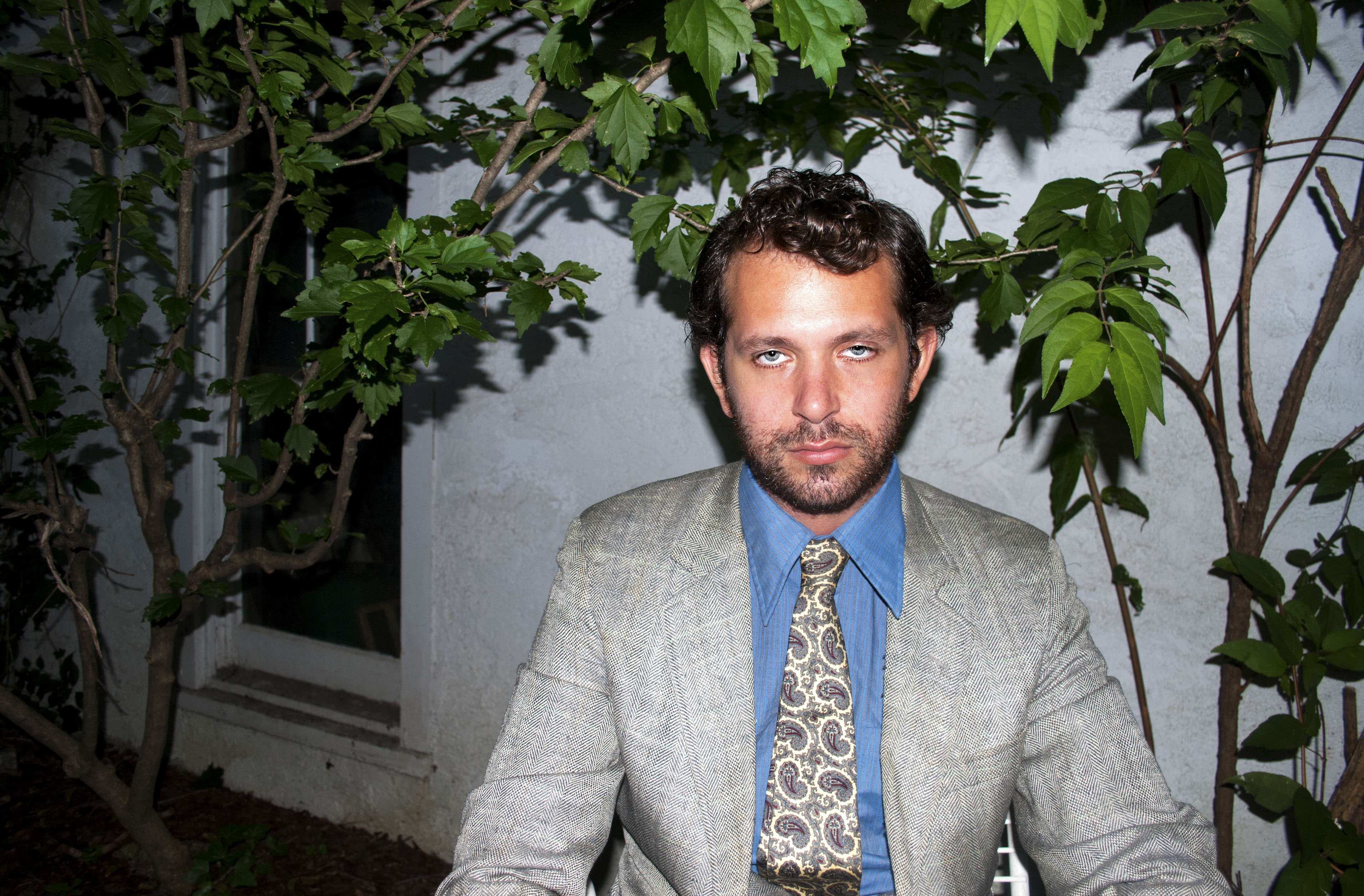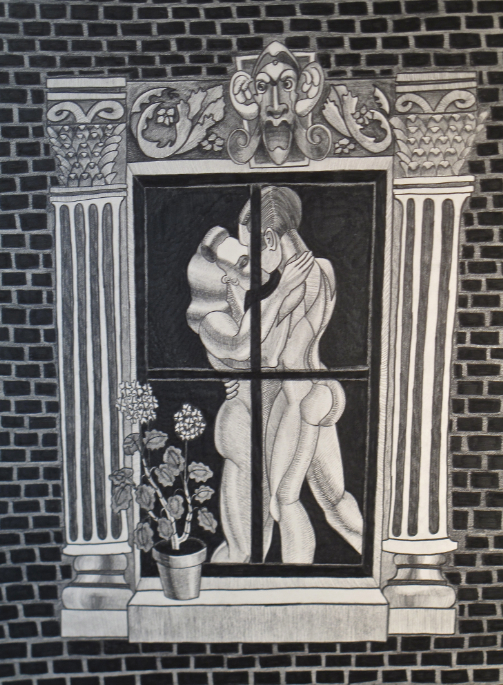
Photograph by Amanda Segur
Royal Young is still hung over.
It’s past noon on a Friday – not yet the weekend! – and the 28-year-old New Yorker is still recovering from last night’s book party the celebrating his new memoir, “Fame Shark: Tales of a Lower East Side Hustler,” (Heliotrope, 2013) in which he catalogs his search to attain celebrity – subconsciously seeking the love and affection of his withholding artist father. Young, nee’ Hazak Brozgold, will do anything for fame: he’ll cut school to be an extra in movies, he’ll allow a famous guy to go down on him and he’ll even change his name to the more romantic-sounding Royal Young. Not to mention do quite a lot of drinking, drugs and sexual experimentation along the way. Young, a staff writer at Interview magazine, discusses his Jewish background in the old hood, his eclectic but loving family, and his generation’s obsession with being “somebody” without doing “something” to achieve it.
*****
So many Jewish young men—Portnoy, for example—have issues with their mothers, but you don’t really, except taking her practice Rohrshack tests, hoping she’d diagnose you with a disorder so you could get the same attention as her therapist patients.
I think my mom is a very sensitive and sweet and smart and beautiful person, but that means that she’s not very interesting to write about per se. I wanted to focus on dark family issues in the book, there were so many issues with my father. He is an incredibly inspiring and creative person. He’s just darker and more in touch with the fucked-up parts of his brain, and his interests running to serial killer [book] and his [naked] art – there’s more for me to explore there.
You write, “My father’s lost fame haunted me.” By seeking fame, you’re really hoping to get the attention of your penis-sculpting father, who seems more interested in his own avant-garde art and his own father’s rejection of him than in you.
It’s not specifically my father’s attention. It’s about family attention and family acceptance. We confuse success with love and success with intimacy, but it’s really not a substitute for that at the end of the day, ever.
The book is written from a perspective of a son who is pretty angry. My father is such an incredible person. I think he’s hilarious, creative, I think there are such moments of tenderness as well, from him toward me. This had to be written like a novel where there is a plot and there is conflict—and that conflict is my dad. That is one version of who he is as a person, that’s one version of our relationship together.
What’s another version?

Royal’s Father’s art.
He taught me almost everything I know about art, he was so supportive about that aspect of me. There were those moments of jealousy and competitiveness—that is between so many and children and their parents, it doesn’t rule their relationship, and luckily with him, it hasn’t. He vowed to be a better dad than his father. I think he succeeded. I really love him, and the reason I was able to write this book is because he is so understanding and loving.
What was his reaction to the book?
He hated it at first! He felt he sounded like a cheap, mean kike. But the book is kind of a monument to how much I love my parents. You’re not able to explore the darks sides of a relationship, unless it’s a healthy one. I was able to write about our conflict because it’s so supportive.
People read the book differently: some find him funny, some find him very caring and involved, and some people think I’m a piece of shit. You never know….
What do you now think of yourself then?
My parents are pretty far out there. When you have to rebel against someone who is pretty far out there, you have to go farther. I was kind of shithead, getting wasted every night, hiding Jim Beam under my pillow. I was such a schmuck, I’m not going to hide that— it’s not a press release, it’s a memoir. I was very much in conflict with both my parents, and so we all decided to go to family therapy and it was hugely helpful. I think as a family, we all were dedicated to seeing it through.
You don’t believe in god, your mother wants you to be bar mitzvahed – which you do for the money. You write, “I thirsted for sex, fame and drama—not davening, the endless moans of religious men as they keened and dipped their heads, bowing to the Torah and a god who was invisible to me.” What’s your relationship to Judaism?
A big part of my life was my name, Hazak Brozgold [“It’s like being wrapped in a big Israeli flag”]. Changing my name from being a walking Jew to something that has something more to do with a profession than a religion allowed me to become close to my Jewish roots and to get more involved with them. I only go to shul on Rosh Hashana and Yom Kippur, but I’m so proud of culturally being a Jew. In New York, you don’t really have to be a religious Jew – although I totally believe in fate or a higher power, it’s not “Hashem” for me, and I don’t have to go to synagogue to be in touch with that energy. I guess I’m more like my father. He’s anti-establishment and very political, and there’s really like a something very smart and deep about his mistrust about the mainstream.
I love the way you describe the Lower East Side of the 1930s, as “an Eastern European shtetl transplant, an unruly Jewish village struggling through the end of the Depression. Its tenements teemed who practiced wild customs—matchmaking, interpreting prophesies from dreams—that they’d imported with silver menorahs hidden under rags during the ocean passage.” You say Babbi – your grandmother– got out of there, and couldn’t understand why your mother wanted to raise her family in the ghetto she escaped. What was your Lower East Side like?
I grew up in the LES in late 80s and walked past hookers and junkies on my way to kindergarten. There was a bare beauty to it. The Lower East Side is such a huge part of my family history and past, when it started changing and being gentrified, the neighborhood I knew disappeared so fast. I’ve made peace with the gentrification, but I don’t like the people who have no interest in the past, have no respect for it. Knowing what you’re moving into is so important. My grandmother has this great Yiddish saying, frim an alta shtudt macht a naya shtudt, ‘From an old city we make a new city.’ New York is always changing, and that’s part of the beauty. Am I nostalgic for the days when I could walk down the street at night and be alone instead of being surrounded by rich frat boys? Totally. But I accept it as it is now.
What is a “fame shark?” Is that a term all the kids are using?
No, not at all. They should be, though. A fame shark started out as someone so lonely they mistake success with love, they mistake celebrity with love. But what it’s really turned into is a hustler, someone who works hard for what they want. There’s a nobility about it. It’s not a fame whore – a fame whore is tacky. The fame shark has a heart. I went in thinking, “yeah, I can do this, I’m cutthroat and I’ll do anything for fame,” but I didn’t and I wouldn’t. I find out I have limits, I find out where my heart is and where my balls are and what line I would have crossed. It was a process of self-discovery.
In “Fame Shark,” you’re in extra in movies, you try to be a model, hobnob with rich and the famous. You don’t really seem concerned about the actual work involved.
Some of the humor here is that I don’t go on auditions for films. I had this very nebulous, delusional, entitled version of celebrity. I was talking about the culture we live in, my generation, with the internet, YouTube, reality TV, Paris Hilton and others who are famous for being nothing. You don’t think that you have to do the hard work. There are so many young kids that are like that. Kids obsessed with celebrity, but not giving their hard work and energy. It’s a real disease in America, these kids on these empty quests.
Do you think hard work is necessary for fame?
If you want to be a good person. I’m like everyone else in America: I read tabloids and In Touch and I watch reality TV, but I think if you want to really grow as a person, the hard work is necessary and important. If you want to be an actor, it shouldn’t be about putting out a sex tape, it should be about actually studying.
I definitely wasn’t aware of this for years. Getting to this place was totally a process, being forced by life to have delayed gratification, to have to go through so much rejection, living in the ghetto for years, going to family therapy, having my grandfather die. I was forced to get to a place of self-awareness, and it’s amazing. I think you need to be crushed by life, and it’s good for you.
So by the end of “Fame Shark,” your family goes to therapy to repair your dynamic, you realize there are things you won’t do for fame, and you trade in cocaine for writing down your pain. Did you go to rehab? Where are you all now?
I never went to rehab. Fortunately for me, I’m too driven to really be an addict. Addiction requires so much attention and determination. I’m not drinking to excess every night, I’m kind of bored with that. I’ve been a journalist for seven years and I’m in a position to help my dad get his artwork there [it’s included in the book]. It’s been such an amazing journey for both of us. My brother put aside filmmaking to explore life, he’s involved in the Occupy movement, and he’s studying American history and politics. He’s really taken a scholarly turn.
What have you learned about fame working at Interview magazine and profiling celebrities?
I learned that everyone is human, I think it’s something that I always knew. We live in society that glorifies celebrity, and seeing it up close and going to so many red carpet events, you just see that people are people no matter who they are and what they do. When you look closer at it, it’s so obvious to me that celebrity can make people pretty unhappy.
*****
You can follow Royal Young on Twitter, and buy his book here.



[…] Royal Young talked with Heeb. […]